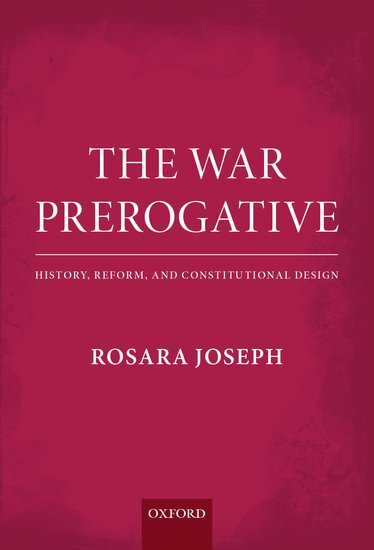In this book, Rosara Joseph studies the evolution of the war prerogative in England from 1600-2012. The author traces the historical theory and practice of the war prerogative and proposes reform of the constitutional arrangements for its exercise. Meticulously-researched and written in a lively and engaging style, the book will interest scholars in international and constitutional law, political science, and modern history, writes Gordon Bannerman.
This review was originally published on the LSE Review of Books.
 The War Prerogative: History, Reform, and Constitutional Design. Rosara Joseph. Oxford University Press. September 2013.
The War Prerogative: History, Reform, and Constitutional Design. Rosara Joseph. Oxford University Press. September 2013.
In The War Prerogative: History, Reform, and Constitutional Design, Rosara Joseph describes the historical, political and legal framework governing the war prerogative in Britain, defined as the Crown’s possession of ‘exclusive power over the making of war and deployment of armed forces’ (p. 110). Drawing extensively on legal, historical, and political material, the author examines the historical evolution of policy processes and outcomes from the seventeenth century to the present-day. Earlier chapters impressively chart the theoretical justification and practical application of the war prerogative, while Chapters 5 and 6 contain the book’s reform agenda. Citing the antiquity of the war prerogative as a valid reason for reform, the author considers it a legacy of outdated monarchical prerogative powers which have ineluctably been transferred to Ministers.
Arguing for a ‘many minds’ approach to circumscribe Executive powers, Joseph advocates introducing parliamentary approval of war-making decisions to ‘advance the goals of impartiality, transparency, accountability, and deliberation, on the core values of democratic decision-making’ (pp. 179-80). Carefully risk-averse towards operational efficiency and national security, she acknowledges that policy initiatives for operational and strategic matters should remain with the Executive. The topicality of the book is obvious: aside from the wider debate concerning secrecy, security, and Wikileaks, recent events have demonstrated that Parliament has a role to play in the decision to go to war which is neither statutory nor precisely-defined, but which equates to a more substantial role than constitutional convention appears to allow. Recent debates on Syria, which obviously occurred after the book went to press, indicate that a convention is developing whereby parliamentary approval is sought before troop deployment. Yet this informal and non-statutory process is not sufficient for the author, who argues for greater statutory powers for Parliament.
Controversy over the legitimacy of war-making powers has a long history. By the nineteenth century, critiques of warmongering and secret Cabinet cabals were regularly heard, and the work of political moralists and radicals like Jonathan Dymond, David Urquhart, and Richard Cobden was informed by notions of ‘secret diplomacy’ and hidden agendas. Historically, the Commons generally accepted a subordinate role in foreign affairs, and despite retaining institutional powers over military finance, has little say in policy formation or apportioning military expenditure, which remain under Ministerial control. MPs have frequently questioned and criticised defence and foreign policy strategy and objectives but the Executive has usually acted without any impediment from or prior sanction of Parliament, largely because Executive powers were historically not explicitly based on democratic mandate but driven by institutional and practical imperatives. Prompt, decisive action, operational secrecy, and strategic command expertise has militated against collegiate decision-making and buttressed exclusive Executive powers.
The theme of institutional competence is familiar enough. Recent conflicts in the Falklands, Kosovo, Afghanistan, and most notoriously Iraq, have demonstrated that Parliament has effectively been restricted to being informed of military activity after the decision for deployment has been taken. Advice, direction, and opinion was neither given nor asked for. Similarly, in relation to the judiciary’s role, the author carefully points out that any decision on deployment is ‘polycentric’, involving many interlocking interests, which judicial processes are ill-equipped to evaluate (p. 139). With the war prerogative a matter of justiciability not jurisdiction, the legality of military action, verified in a recent legal case over Iraq, is deemed an issue of international law, more properly the province of diplomacy and politics. This, along with institutional competence and legitimacy, underpinned by national security concerns, inhibit judicial consideration, ensuring that Parliament continues to be identified as the legitimate institutional arena for scrutiny of Executive activity.

It is upon that acknowledged legitimacy that Joseph’s reform agenda, envisaging a more substantive role for Parliament with an additional ‘back-stop’ role for the judiciary, is constructed. These ‘institutional mechanisms’ are adopted to promote democratic values and efficient decision-making (p. 157). Despite recognising that elitism in decision-making has a respectable intellectual lineage, from Plato to Mill and Schumpeter, the author denies any conflict exists between democratic reform of the war prerogative and operational efficiency. Citing intelligence failures post-9/11, she suggests that the claims of ‘experts’ possess superior ability to make judgements about scientific and ethical matters are ‘dubious’ and that ‘legitimate authority does not follow simply from expertise’ (p. 167).
The critique of the conduct of the Blair Government’s foreign policy, especially towards Iraq, remains powerful and relevant. Here, Cabinet collective responsibility and the weakness of Parliament conspired to undermine any critical counter-weight to Executive inner-circle deliberations and Group-Think. The author advocates moving away from such Executive exclusivity, and two separate parliamentary reviews since 2003 support her case, both concluding that the Commons should have an enhanced role in decisions over deploying troops. Indeed, it is greater consultation and scrutiny rather than assumption of Executive powers which form the basis of her proposals. A majority Commons vote supporting deployment would be a statutory requirement, necessary as a means of ensuring procedural compliance, while the Lords would exercise greater oversight. Additionally, she advocates, on the basis of accountability and transparency, the publication of material relevant to the case for deployment, including operational objectives, and logistical matters of cost, expected duration, location, and number of troops. Despite allowing for emergency exceptions based on national security, safety of service personnel and secrecy surrounding covert operations, releasing this type of information arguably poses a risk to the success of military operations. Moreover, the idea that the Commons’ involvement would improve the intrinsic value of decision-making and increase the likelihood of a ‘good’ decision is highly subjective and contentious. Similarly, the claim that wider participation would improve accountability and scrutiny, strengthen public trust, and even make the recourse to war less likely appears too optimistic (p. 167). Joseph acknowledges real-world deliberations potentially undermine the collective deliberation model, for politicians are not impartial, rational participants, and party politics would not be eliminated. In these terms, the proposed Joint Parliamentary Committee providing oversight and scrutiny, modelled on the Intelligence and Security Committee, appears problematic, in terms of its appointment and its specific remit and powers. The author states that the Committee ‘might’ include Lords with expertise on national security issues, but why the emphasis on expertise if legitimate authority does not follow from it? Would this not represent a return to elitism under cover of institutional competence and parliamentary accountability? Yet, even with more Crossbenchers and fewer party politicians, there is no great reservoir of expertise and knowledge to draw on, for according to the official parliamentary website, only 42 of 778 Lords cite ‘Defence’ as an area of policy interest, with 115 interested in the less precise ‘International Affairs’.
With parliamentary approval required where force would be used or was likely to be used, or where military objectives changed during the course of operations, Joseph advances a substantive role for the Commons in the processes leading up to and including the vote on deployment. Without that earlier intervention and deliberation, the legitimacy of decision-making is for her reduced to an ‘aggregation of votes’ simply adding ‘a veneer of democratic legitimacy to an executive fait accompli’ (p. 216). Notions of democratic legitimacy and accountability, underpinned by an assertion of Parliament’s institutional competence and expertise, inform the entire book. While lauding Burkean constitutionalism, the author warns against an erroneous identification between constitutional antiquity, continued relevance, and political authority. The book fittingly ends with a specimen of hyperbolic eighteenth-century rhetoric, warning that the decision to deploy armed forces is ‘too important and solemn … to leave to the Prime Minister and an inner cabal of government ministers’. (p. 219)
Meticulously-researched and written in a lively and engaging style, the book will interest scholars in international and constitutional law, political science, and modern history. There is a fine interdisciplinary blend of material though international comparisons may have usefully located the British war prerogative in a broader context. More substantively, despite forensic examination, rigorous analysis, and a coherent and thought-provoking reform agenda, Joseph does not present a totally convincing case, either of the need for reform or the practical efficacy of her proposals. It remains unclear what exactly the positive outcomes of her reforms would be, for the circumstances of any prospective deployment are likely to be so varied that military and political flexibility would be required. Moreover, recent debates on Libya and Syria do indicate a greater concern with parliamentary approval, and demonstrate that when the case for intervention is controversial or ambiguous, Parliament’s role is enhanced—in itself evidence of democratic accountability and transparency. Although this process is taking place on a non-statutory basis thus far, it is a significant indication that parliamentary and public opinion is considered when the exercise of the war prerogative is contemplated. While greater scrutiny and transparency are not to be disparaged, the current balance between Executive authority, parliamentary scrutiny, and the operational expertise of military command, though not perfect, appears well-attuned to contemporary political and military imperatives, and the case for reform appears at present not proven.
—————————————–
Dr Gordon Bannerman is a private tutor, researcher, writer, and author based in Dundee. He received his Ph.D. from King’s College London in 2005, having previously studied medieval and modern history at the London School of Economics and King’s College London (BA: LSE, 1997; MA: KCL & LSE, 1998). He has previously taught Modern British History at the University of Dundee, King’s College London, and the London School of Economics. Read more reviews by Gordon.





